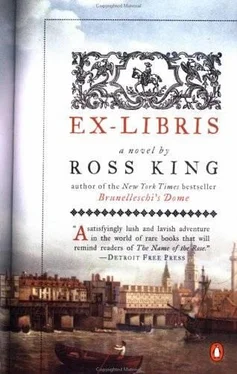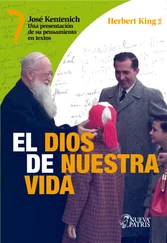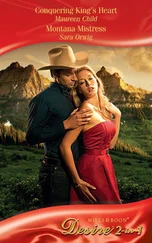Safety? She averted her eyes and stepped back from the railing, wrapping her cloak more tightly about her shoulders. All night there had been rumours, each worse than the last. The Transylvanian soldiers had failed to make their appearance, as had the English troops, and the Magyar horsemen were either dead or had deserted to the Emperor. The first Cossacks were now making their way down the hill towards the bridge, whose gates could not be defended for long. The Catholics had triumphed. Prague was to be sacked, its citizens taken prisoner and tortured-if they weren't put to the sword first, that is, every last one of them, God save their souls.
King Frederick would not be captured, however. Already he had fled to his fortress at Glatz, or so another rumour claimed. But the Queen was here still, inside the house, making preparations of her own. All night Emilia had heard the shrill squawks of her monkey and the banging of doors as her ambassadors and advisers trooped in and out of the chamber. This was the hour when Emilia and the other ladies-in-waiting would be summoned by a page or a bell to participate in the hour-long ritual of draping the royal personage in layers of silk and damask, then fastening buttons, tying ribbons, stringing jewels, curling hair with heated tongs, completing the magical transformation of slight, frail Elizabeth into the Queen of Bohemia. But this morning no page had knocked and no bell had rung. Perhaps she was forgotten? Nor had there been any sign of Vilém, either inside the house or outside in the square, and no smoke rose from the chimneys in Golden Lane. So she stood on the balcony, with nothing to eat and nothing to read, and waited.
A shout rose from the square and she looked down to see Sir Ambrose Plessington tramping about in the snow. He at least was much in evidence. Last night he had escorted her upstairs to her room before disappearing, wordlessly, with the leather-bound parchment still tucked under his arm. This morning there was no sign of the parchment, though he was supervising the loading of crates of books on to one of the wagons, prising up their lids with his scimitar, then hammering them shut. There must have been a hundred crates in all. She wondered for the dozenth time what he had been doing in the library the previous night. Perhaps he was behind Vilém's disappearance? The two must know each other, she reasoned. Possibly Vilém was even part of whatever dark plot had brought the Englishman to Prague. From Vilém she knew, that the library held, among its thousands of books, a secret archive, a locked subterranean chamber where the most valuable and even dangerous books were housed, those listed in the Index librorum prohibitorum , the Vatican's catalogue of forbidden books. Only a handful of men had access to this mysterious sanctum. Each year hundreds of scholars travelled to Prague to study in the library-scholars whose appearance, like swallows or cuckoos, heralded the arrival of spring. But none was ever allowed a glimpse of the books in the secret archive. Not even Vilém, their keeper, was permitted to read them. They included, he once explained, the works of religious reformers such as Huss and Luther, along with tracts by their followers and scores of other heretics besides. There were also works by renowned astronomers. Both Copernicus's De revolutionibus orbium coelestium and Galileo's disquisition on tides were lodged in the archives, as were various treatises on both the comet of 1577 and the new star that had appeared in the constellation Cygnus-works that supposedly contradicted the hallowed wisdom of Aristotle. Vilém had disapproved of such secrecy, especially where the scientific treatises were concerned. How many evenings in Golden Lane had she spent listening to him complain about the Index librorum prohibitorum? Books such as those of Galileo and Copernicus were meant to stir up debates among scholars and astronomers, he insisted, to challenge old prejudices and enlighten the ignorant, to work towards a great instauration of knowledge. Whatever wisdom they might possess became dangerous only when it was hidden away from the rest of the world-hidden away by the secretive few who, like the cardinals in the Holy Office, wished to rule like tyrants over the many.
Now as she watched Sir Ambrose inspect and then nail shut another crate she wondered whether the books from the secret archive had been removed from the library along with all the others. Perhaps the volume she had seen last night was one of them, some book feared and forbidden by Rome? For she knew from what little she understood of the treacherous morass of Bohemian politics that the Englishman was, like Frederick and Elizabeth, a champion of the Protestant religion and an enemy to both the Emperor Ferdinand and his brother-in-law, the King of Spain. Court gossips claimed that three years ago Sir Ambrose had taken part in the expedition of another daring Englishman and Protestant champion whose fleet sailed to Guiana in the hope of capturing a gold mine from the Spanish. Sir Walter Raleigh's voyage had been a disaster, of course. The mythical mine had not been found; nor had the sought-after route through the Orinoco to the South Seas. Nor had the Spaniards been trounced in battle and driven from the shores of Guiana. To cap it all, Sir Walter had lost his head for his troubles. But Sir Ambrose had survived-if, indeed, he took part in the voyage in the first place. Now she wondered whether his unexplained reappearance in Prague was for the same type of mission, yet another strike against the detested Catholics. If so, had the men who pursued them through the streets of the Old Town the previous night been the agents of a cardinal or bishop?
'Mistress…'
The astronomical clock across the square was striking eight. She turned to see the serving-maid framed in the doorway, strangling a lace handkerchief in her hands. She looked as though she had been weeping. From outside in the corridor came the sound of the Queen's voice and from below the lowing of an ox, then Sir Ambrose's angered curse.
'Come,' the girl was whispering. 'A coach has been prepared.'
***
It was another hour before the convoy began its march through the streets of the Old Town, led by a troop of horse. A winding river of horse-carts, baggage-wagons, carriages, pack-mules with baskets and panniers: it was as if the entire contents of Prague Castle had been decanted into the ramshackle caravan. One by one the vehicles inched forward, two abreast, into the narrow streets, moving eastward, the axles ploughing through the snow and the oxen baulking in protest as if headed for the shambles. Thin panes of ice crunched under their hoofs as they were whipped along the street, their traces stiff with frost. Progress was slow and disorderly. For minutes at a stretch the caravan stood at a standstill as the horsemen struggled to clear snow from their path with their boots and the butts of muskets. Then the snow began to melt and the streets became a quagmire and passage even more difficult. In thirty minutes the front of the procession had rolled barely halfway down Celetná Street.
Emilia was squeezed inside one of the smaller coaches at the back of the caravan, riding bodkin between two of the other ladies-in-waiting. She was shivering inside a stable blanket, flexing her fingers, blowing on to them, rubbing her palms together, clapping her hands and then thrusting them deep into her covering of sheepskin in a series of frenetic but futile rituals. She also kept twisting round in the seat to peer through the quarter-light at the square and then up at the castle, not looking for the pursuing Cossacks, like the others, or even for the three black-clad horsemen. But it was too late, she realised, as they rolled past the untidy jumble of empty wooden stalls strung along the walls of the Hussite church. They were leaving Prague. Vilém would not find her now, even if he was still alive.
Читать дальше












